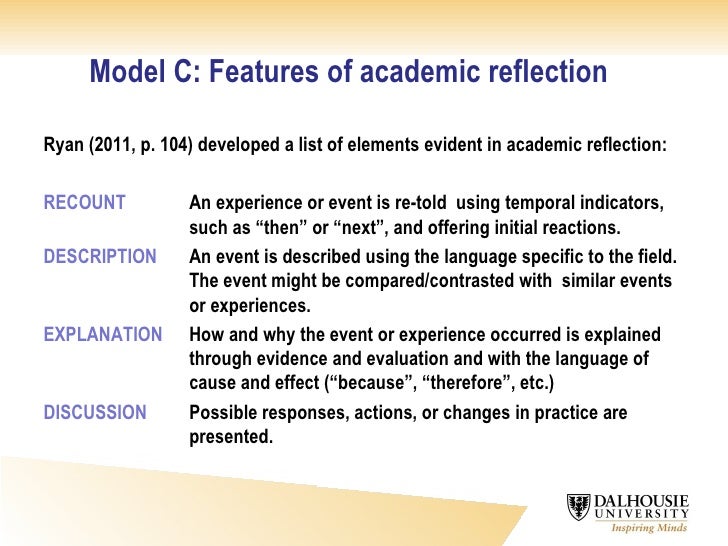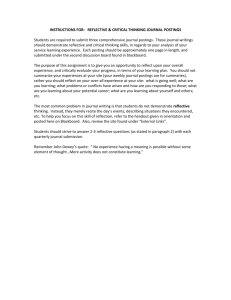
Reflecting on practice
REFLECTIVE WRITING: DIEP • Answer the question: ‘What did I do, read, see, hear, etc?’ I – Interpret the events. • Consider why events happened in the way they did. Explain: – what you saw and heard – your new insights – your • Answer the question: ‘what might this Describe 1. Describe the insight An insight is something new that you learned or realised. The insight must be relevant to the 2. Describe the circumstances DIEP strategy for writing a reflection. In your entries, attempt to: • analyse your own performance as a learner. • evaluate your gains in understanding and completing tasks. • verbalise how you feel about your learning. • make connections with other experiences, ideas. • demonstrate transfer of

Study skills
07/08/ · Writing a reflective document: The DIEP framework. DIEP:= Describe -> Interpret -> Evaluate -> Plan. D-Describe. Describe objectively what you learned from the incident; Respond to the question: “What did I observe, hear, and learn from the incident?” I-Interpret. Explain your personal interpretation of the learning you DESCRIBED 03/04/ · REFLECTIVE WRITING: DIEP Reflective writing can be included in a variety of different assignment tasks. It can include keeping a reflective journal or learning log with multiple entries – particularly for professional placements – or be part of an essay or report. Reflective writing aims to get you to think Survive and shoot at others while trying to keep your own tank alive!

Post navigation
DIEP: Describe Begin by describing the situation. What did you see, hear, do, read or see? Be as brief and objective as The most interesting insight from my lecture this week is A significant issue I had not realised until now is I now realise (understand ) that Interpret Interpret Study Tips: Reflective Writing - DIEP July REFLECTIVE WRITING: DIEP Reflective writing can be included in a variety of different assignment tasks. It can include keeping a reflective journal or learning log with multiple entries – particularly for professional placements – or be part of an essay or report. Reflective writing aims to get you to think 03/04/ · REFLECTIVE WRITING: DIEP Reflective writing can be included in a variety of different assignment tasks. It can include keeping a reflective journal or learning log with multiple entries – particularly for professional placements – or be part of an essay or report. Reflective writing aims to get you to think

Getting started at uni
Study Tips: Reflective writing process. 2. DIEP STRATEGY. DIEP* is a strategy to help with writing a critical or academic reflection in four paragraphs. The four steps in this approach are to d escrib e an insight (new understanding), to in terp ret and evalu ate it, and to p lann how it might transfer to future practice or learning DIEP strategy for writing a reflection. In your entries, attempt to: • analyse your own performance as a learner. • evaluate your gains in understanding and completing tasks. • verbalise how you feel about your learning. • make connections with other experiences, ideas. • demonstrate transfer of DIEP: Describe Begin by describing the situation. What did you see, hear, do, read or see? Be as brief and objective as The most interesting insight from my lecture this week is A significant issue I had not realised until now is I now realise (understand ) that Interpret Interpret

Video tutorial
REFLECTIVE WRITING: DIEP • Answer the question: ‘What did I do, read, see, hear, etc?’ I – Interpret the events. • Consider why events happened in the way they did. Explain: – what you saw and heard – your new insights – your • Answer the question: ‘what might this DIEP Strategy for writing a reflection. In your entries, attempt to: • analyse your own performance as a learner • evaluate your gains in understanding and completing tasks • verbalise how you feel about your learning • make connections with other experiences, ideas • demonstrate transfer of learning 07/08/ · Writing a reflective document: The DIEP framework. DIEP:= Describe -> Interpret -> Evaluate -> Plan. D-Describe. Describe objectively what you learned from the incident; Respond to the question: “What did I observe, hear, and learn from the incident?” I-Interpret. Explain your personal interpretation of the learning you DESCRIBED
No comments:
Post a Comment